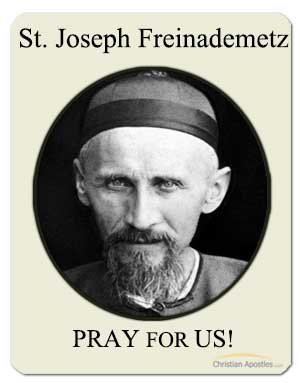Saints
St. Joseph Freinademetz
St. Joseph Freinademetz Biography
 St. Joseph Freinademetz (also known as St. Joseph Mary Freinademetz) was a Catholic priest and missionary who is venerated as a saint by the Catholic Church. He was born in 1852 in the Kingdom of Italy and he is remembered for his tireless efforts to spread the gospel and to serve the poor and disadvantaged.
St. Joseph Freinademetz (also known as St. Joseph Mary Freinademetz) was a Catholic priest and missionary who is venerated as a saint by the Catholic Church. He was born in 1852 in the Kingdom of Italy and he is remembered for his tireless efforts to spread the gospel and to serve the poor and disadvantaged.
Freinademetz was ordained a priest in 1875 and he immediately felt called to serve as a missionary in China. He arrived in China in 1879 and spent the next 45 years working to spread the gospel and to serve the Chinese people.
Freinademetz faced many challenges during his time in China, including persecution and hostility from the authorities. He persevered in his work, however, and became known for his tireless efforts to bring the message of the gospel to the Chinese people.
Freinademetz is remembered for his great devotion to God and for his selfless service to others. St. Joseph Freinademetz is the patron saint of China. The feast day of St. Joseph Freinademetz is celebrated on January 31st by the Catholic Church.
Popular St. Joseph Freinademetz Medal
The Life of St. Joseph Freinademetz: A Missionary to China
Prayer to St. Joseph Freinademetz
Dear St. Joseph Freinademetz, holy missionary and servant of Christ, we turn to you today and ask for your intercession.
You dedicated your life to spreading the gospel and to serving the poor and disadvantaged in China. Your tireless efforts to bring the love of Christ to the Chinese people are an inspiration to us all.
We pray that you will continue to guide and protect all missionaries as they carry out their work of spreading the gospel throughout the world. Help us to follow your example of selfless service and to always strive to bring the light of Christ to others.
We ask that you intercede for us with the Lord, that we may be guided by His love and mercy. We pray that you will help us to grow in our faith and to be instruments of peace and love in the world. We ask this through Christ our Lord. Amen.
Quotes by St. Joseph Freinademetz
These quotes by St. Joseph Freinademetz highlight his deep devotion to God and his commitment to spreading the gospel and serving others. They offer insight into his spiritual wisdom and his understanding of the importance of love and selflessness in the Christian life.
-
“A person must not only be convinced that the Gospel is true, but must also be ready to accept all that it demands and to live it.”
-
“Love is the only force that can change the world.”
-
“We must love the Chinese people, and make them love us, so that the Gospel may be loved by them.”
-
“The greatest love is to lay down one’s life for one’s friends.”
-
“To love means to give.”
Reflection on the Feast of St. Joseph Freinademetz
In Summer 1878 it was time for Josef Freinademetz to say good bye: good bye to the familiar surroundings, to parents, relatives and friends, to the flow of life he had grown used to; good bye also to the kind of life for which he had prepared himself for so long: the security and warmth of the parish house, the work as assistant parish priest which he had come to like very much. To say good bye means to go away; it means to leave behind what had been important until now, that which had filled the life of Joseph Freinademetz and given meaning to it. Why does he do this, what moves him? Does he know what he is doing, what he is getting into?
On Sunday, August 11, 1878, he said good bye to the parish of St. Martin in Thurn, where he served as assistant parish priest and elementary school teacher:
“The divine good shepherd in his unfathomable goodness has invited me to go out together with him into the desert in order to help him in his search for the lost sheep. What else should I do but kiss his hand full of joy and gratitude and say with the Scriptures: ‘Behold I come!’ and with Abraham leave my father’s house, native land and you, my dear ones, and go to the land which the Lord will show me.” A week later, in his home parish St. Leonhard, he added: “For me, too, it is difficult – I cannot deny this – to leave my dear parents and so many benefactors and friends. But after all, man is not meant for this world. He has been created for something greater: not to enjoy life, but to work wherever the Lord calls him.”
Joseph Freinademetz did not piously look for self sacrifice; he did not follow the itch for adventure or romantic wanderlust. Joseph Freinademetz felt called, he followed an invitation – and set out on a journey like Abraham long ago. To leave, to say good-bye was difficult for him, but he did not hesitate because he was sure that he was on the way to the land that God would show him, as the Bible says of Abraham. He set out to do the will of God and was thus led to himself, to fulfillment in life.
His inner sentiments are laid bare in a letter which he wrote to Franz Thaler, his friend and benefactor in Sottrù, a small village next to Oies, on February 18, 1879, a few days before the departure ceremony in Steyl:
“… Dear friend, at times I find it hard to live far away from those whom I have loved so much, to leave my native place, which has given me so many friends and joys, and to look for another home where one has to start from the very beginning like a child beginning life anew, where one has to learn new and very difficult languages and get to know people who have completely different interests and customs … It is hard to begin such a life after I have been so happy among you Ladins. And I say it to you in all honesty: I would never do this for anything in this world, not even for millions of worlds. But I am very happy and content that I can do this for the good Lord up there, even if I would encounter death a thousand times. And I know his grace will never abandon me. My only desire is to be able to convert many, very many of our poor brothers. Only for this do I leave my dear father, my dear mother, my brothers and sisters, relatives and friends, among whom you occupy one of the very first places, and my beloved St. Martin.”
Reflection on the Life of Joseph Freinademetz
Joseph Freinademetz left his native land, but he did not go in search of another one. He remained “stateless”, and even later in the midst of his Chinese whom he loved so much he felt being a stranger. The reason why he “set out on the journey” was his faith, the faith that gave him assurance that he would find his home in God, that he would be sheltered “in the shadow of his wings” as the Psalmist says. 1 Pet 2:13 states: “Beloved, you are strangers and in exile.” “After all, man is not meant for this world …” the young Freinademetz told his home parish.
In my life, to which things did I say good bye, from which have I moved away, perhaps in pain? Where do I feel at home and sheltered? Am I on the way, like Abraham and Freinademetz, to the “land” which God wants to show me? Do I inquire about this land, to I look for it? – “By the infinite mercy of God, who chooses the weak as his instruments I hope to share in a grace of which I am not worthy for eternity”, Freinademetz said when bidding good bye to St. Martin.
Saints Similar to St. Joseph Freinademetz
You may also be interested in reading the Biography of St. Damien of Molokai. Both were missionaries known for their work in foreign lands. Next up: Biography of St. Joseph Marello
Also check out our handmade St. Joseph Freinademetz Medal and St. Joseph Freinademetz Rosary and St. Joseph Freinademetz Rosary Bracelet.

